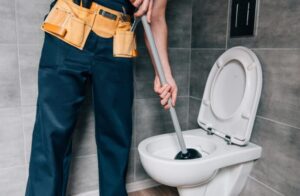Have you ever wondered, “Can I flush pills down the toilet with a septic tank?” If so, you're not alone. Many people are unsure about the impact that flushing pills can have on their septic systems.
This article delves into whether it is safe to flush pills down the toilet with a septic tank and what you need to know to protect your home and the environment. Join us as we explore the dos and don'ts of pill disposal.
Understanding the Septic System
 To truly grasp the essence of the conundrum, “Can I flush pills down the toilet with a septic tank?”, one must first understand the intricacies of a septic system.
To truly grasp the essence of the conundrum, “Can I flush pills down the toilet with a septic tank?”, one must first understand the intricacies of a septic system.
A septic system is ingeniously designed to treat and dispose of household wastewater in areas lacking centralized sewer systems. At its core, the system comprises a septic tank and a drain field, where solids settle at the bottom, and the liquid effluent disperses into the soil for natural treatment.
This delicate balance hinges on promoting the growth of beneficial bacteria that break down waste. Introducing foreign substances, such as medications, can disrupt this ecological equilibrium, potentially compromising the system's functionality and the environment. Grasping this can illuminate why certain disposal methods may have unforeseen consequences on septic systems and beyond.
Can I Flush Pills Down the Toilet with a Septic Tank? Assessing the Risk
The question, “Can I flush pills down the toilet with a septic tank?”, often arises from a concern for convenience but overlooks potential risks.
- Introducing pharmaceuticals directly into your septic system can disrupt the microbial balance critical for decomposing waste.
- Moreover, certain medications contain compounds toxic to the bacteria in septic systems.
When these essential bacteria are harmed, the efficiency of your septic system in treating wastewater diminishes, leading to possible system failure and environmental contamination. This risk isn't just theoretical; studies indicate that medications flushed into septic systems can leach into groundwater, posing risks to aquatic life and potentially entering human water supplies. The implications suggest a need for greater consideration and care in how we dispose of our medications, with an eye towards methods that preserve the health of our septic systems and broader environmental safety.
The Environmental Impact of Flushing Pills
 While contemplating whether flushing pills is a viable option, it’s vital to consider the broader environmental impact. Beyond just the septic system, flushed medications can journey through wastewater treatment processes, which are not designed to fully remove pharmaceutical substances.
While contemplating whether flushing pills is a viable option, it’s vital to consider the broader environmental impact. Beyond just the septic system, flushed medications can journey through wastewater treatment processes, which are not designed to fully remove pharmaceutical substances.
Consequently, these substances can end up in rivers, lakes, and drinking water sources, posing threats to aquatic ecosystems and wildlife. Research has shown that exposure to even trace amounts of pharmaceuticals can significantly affect fish and other aquatic species, altering their behavior and physiology.
Furthermore, the introduction of antibiotics into water bodies contributes to the growing issue of antibiotic resistance. This overarching environmental challenge underscores the importance of seeking alternative, safer disposal methods for unused or expired medications, emphasizing our collective responsibility towards minimizing our ecological footprint and protecting water quality for all forms of life.
Safe Alternatives to Flushing Pills Down the Toilet
Recognizing the hazards posed by flushing pills, exploring safe alternatives is crucial.
Instead of risking the health of your septic system and the environment, consider utilizing local drug take-back programs, often available at pharmacies or through community events. These programs ensure that medications are disposed of securely and responsibly.
If such a program is not accessible, the FDA recommends mixing pills (do not crush them) with undesirable substances like coffee grounds or cat litter, sealing the mixture in a plastic bag, and disposing of it in the household trash. This method helps prevent drug diversion and reduces the chance of accidentally contaminating water sources.
Always remove personal information from prescription labels to protect your privacy. Being informed about these alternatives not only helps protect your septic system but also contributes to a healthier environment.
Is It Safe to Flush Pills Down the Toilet with a Septic Tank? A Closer Look
Taking a closer look at the query, “Is it safe to flush pills down the toilet with a septic tank?”, reveals a clear consensus among experts: it's not advisable.
 This advice stems from understanding how septic systems work and their role within the larger environmental context. Flushing medications threatens the intricate balance of microbial life within the septic tank and risks contaminating groundwater and soil. Such actions counteract the principles of ecological stewardship and responsible waste management.
This advice stems from understanding how septic systems work and their role within the larger environmental context. Flushing medications threatens the intricate balance of microbial life within the septic tank and risks contaminating groundwater and soil. Such actions counteract the principles of ecological stewardship and responsible waste management.
While it might seem like an easy and quick solution to dispose of unwanted medications, the potential consequences for your septic system's efficiency and the broader environmental implications make this practice undesirable. Embracing alternative disposal methods can safeguard the integrity of your septic system and contribute to the overall well-being of our ecosystems.
Maintaining Your Septic System: Best Practices
Maintaining your septic system in prime condition requires adherence to a few best practices, pivotal for its longevity and efficiency.
Regular inspections, typically recommended every 1-3 years, can identify potential issues before they escalate. Pumping the septic tank every 3-5 years, depending on usage, ensures that solids don't accumulate to problematic levels. Be mindful of what goes down your drains; avoid flushing harsh chemicals, non-biodegradable items, and, as discussed, pharmaceuticals, all of which can disrupt the microbial balance. Also, conserving water and repairing leaks promptly can prevent the system from becoming overwhelmed.
Thoughtful landscaping can protect the system too; plant trees away from the drain field to prevent root intrusion. Adopting these measures, along with responsible medication disposal practices, not only extends the life of your septic system but also supports environmental health and sustainability.
